Ensuring our future one garden at a time
Sticky from heat and covered in red dirt, we bumped for hours down a remote red road snaking its way through rolling hills of Northern Uganda. Little did I know I was about to be transported to the future of food, where I would meet refugee farmers who have discovered the key to growing food in barren and inconsistent conditions. In a climate warming faster than any time in recorded human history, the skills they are cultivating now may be the key to your family’s future.
As I covered my face with a scarf to choke down the exhaust fumes spewing from a truck in front of us, a mixture of US country music and Ugandan R&B played on the radio of our late 90s model SUV. The only clue we were on the right track was the occasional sign “Palabek Refugee Settlement.”
Then, seemingly out of nowhere, we reached a black and white barrier arm “Police Checkpoint” before we entered the gated razor-wired headquarters of the United Nations High Commissioner for Refugees (UNHCR). We were in the Palabek Refugee Settlement.
White industrial tarp air-conditioned tents served as their head office where we checked in. Notoriously difficult for journalists to gain access to, I was fortunate to be here documenting African Women Rising’s (AWR) Permagarden program taking place inside the camp. I was here to learn how an innovative food security program is disrupting a broken aid system and changing lives – one garden at a time.
The one condition for my presence: we had an armed man in a khaki uniform labeled ”police” with us at all times.
According to Human Rights Watch, “The world currently has 25.4 million refugees, who have fled because of war, violence, and persecution. Another 40 million were forced to flee their homes but still live in their country.” And that number only grows by the day. Prospective refugees fleeing violence assume there is a better life away from the chaos. No one envisions living in a mud hut, with no job, and slowly starving to death. But that is what over 40,000 South Sudanese refugees have found here.
Probably the biggest hurdle in starting life over in a new country (after overcoming the trauma of losing your established life and loved ones) is that many people arrive with only the clothes on their back. You are given a white tarp with the blue logo “UNHCR”, 4 sticks to use as tent poles, a 20-liter jerry can for water, a food ration card (that only lasts 3 weeks eating one time a day – but we will get to that), and a cooking pot to start you new life. Few if any displaced people here have additional resources – like money – to start over.

In 2014 this remote corner of Uganda was just locals, then Palabek Settlement opened and the refugee camp quickly overwhelmed the existing villages. Since AWR was working in the area before the refugees arrived, they are the only Ugandan nonprofit to be working alongside huge international aid players like Oxfam, The International Red Cross, and International Rescue Committee.
The field team directs us to Zone 5B, block 11 where their program is operating. The first thing that strikes me is that this is the most oddly idyllic setting for a refugee settlement I have ever visited. The ones I have experienced have been in arid valleys with no trees surrounded by barren land. But this place is on the verge of lush with green trees, deep red clay dirt, and abundant signs of greenery, thanks to the Permagarden project vegetable gardens growing on almost every spare square inch of land. The importance of the garden is driven home when we visit another block inside the camp; they seem barren compared to the area where AWR is working.
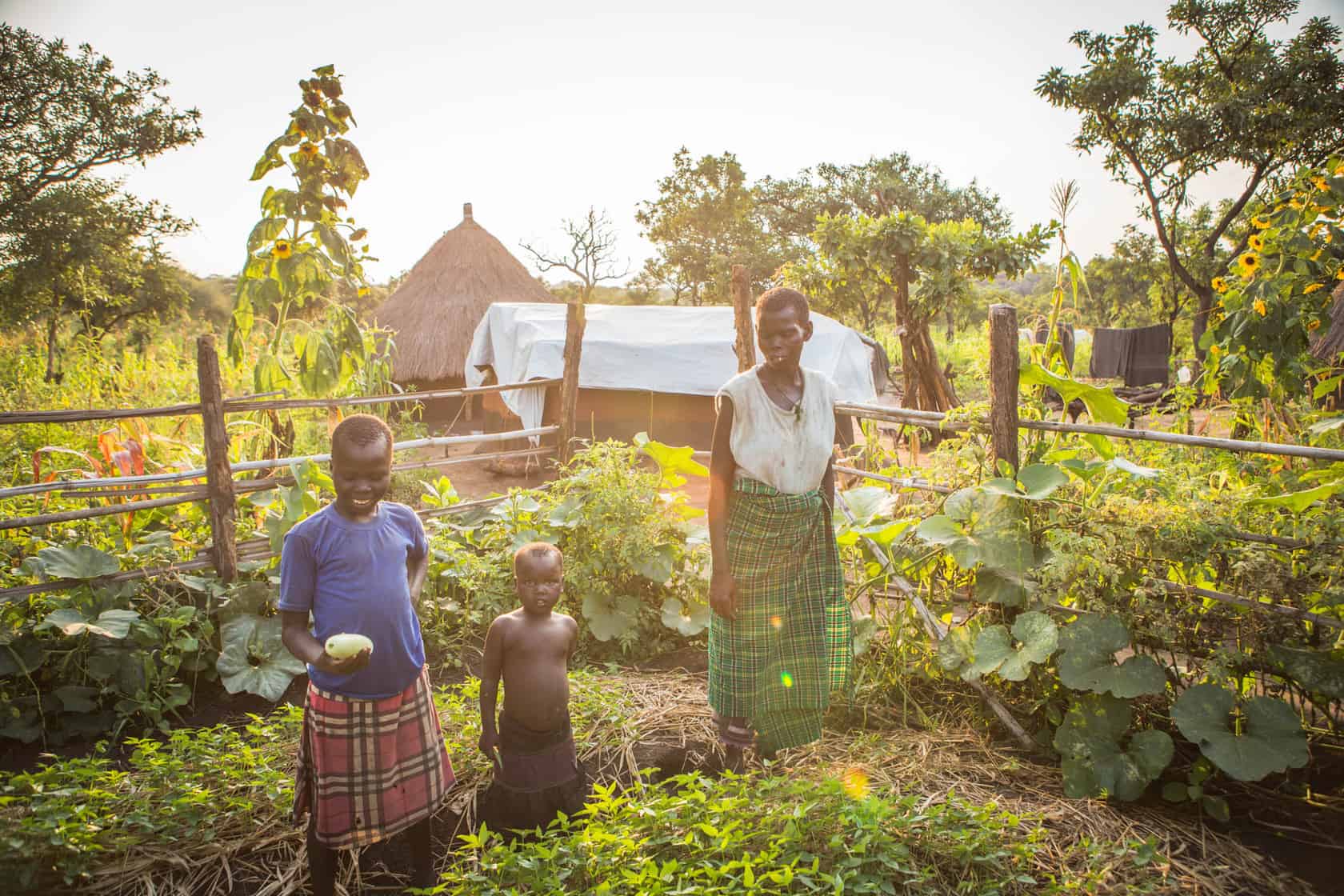
The success of AWR’s permagardens is so enviable that other aid organizations are taking notice. Their first training was about 20 refugees. Now their program serves thousands.
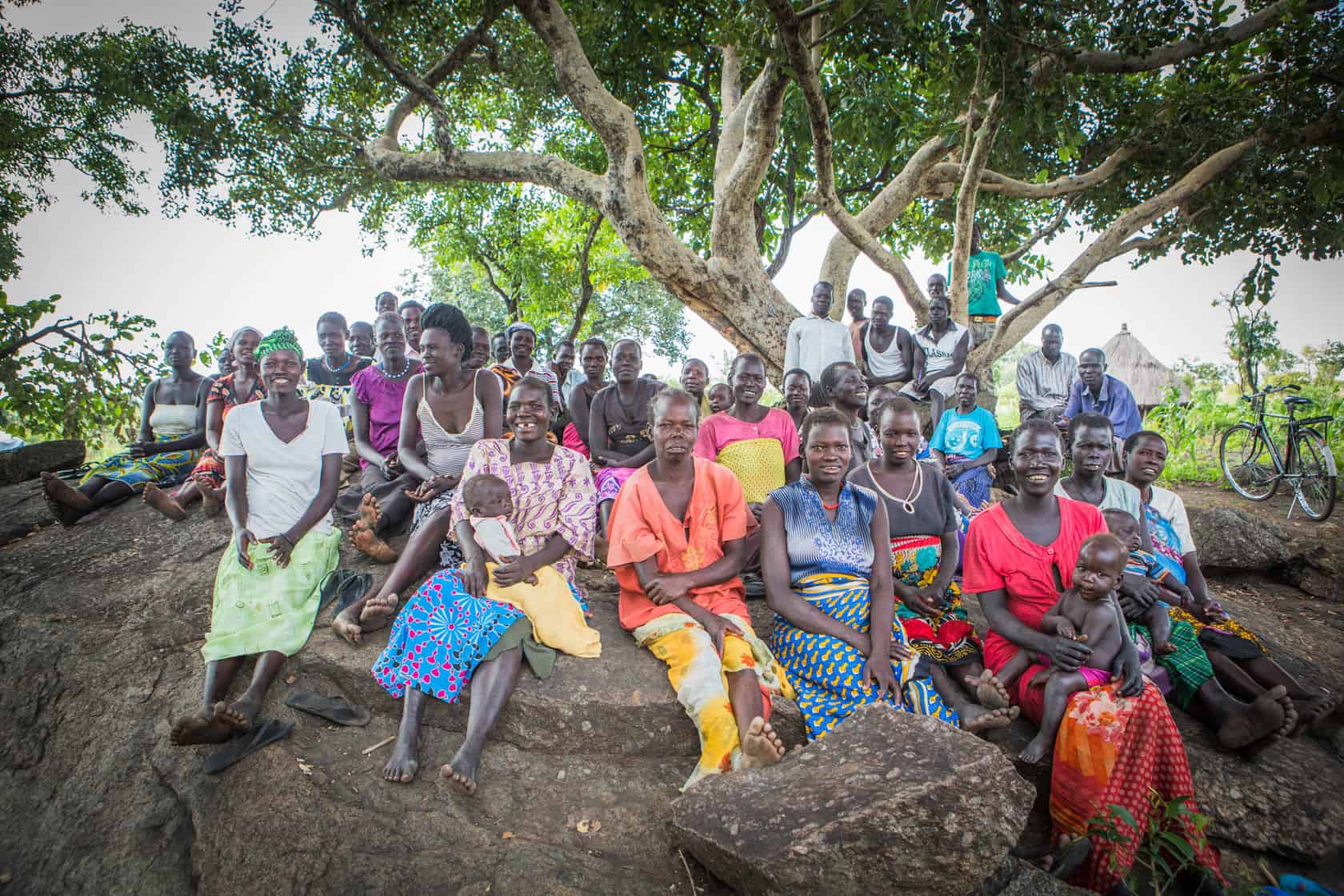
We met a group of 30 farmers gathered on a boulder under a huge tree. One young and strikingly beautiful mother, excitedly jumped up to greet me. Forgetting she had just been breastfeeding her young daughter, she eagerly extend her hand and we both burst out laughing as she looked down to discover one breast hanging out of her yellow and white striped v neck T-shirt. She shrugged as if to say what can you do, and quickly tucked her breast inside her shirt before shaking my hand.
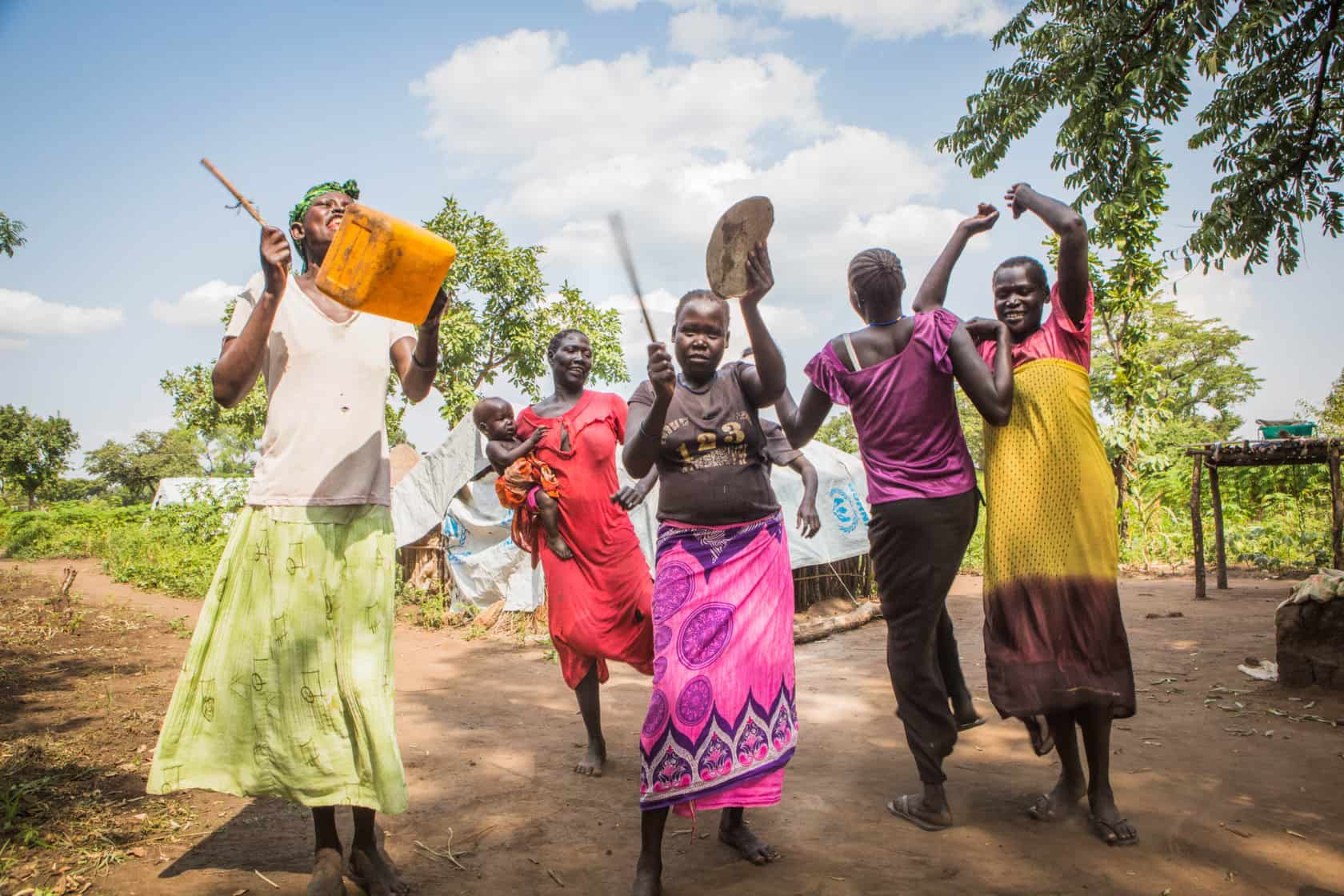
When you become a refugee your food ration card entitles you to food provided by the World Food Program. Your maize, beans, oil, sugar, and salt – measured down to the ounce – are supposed to last you for one month. When I completed the food distribution with one young woman I met, she was thumb printed and retina scanned before she could collect a portion so small, I was in shock. The contrast of biometric metering vs the meager low quality food was not lost on me. It seemed like a cruel joke. I think it would last me about two weeks and I would feel like shit. It is going to be her only food for one month and she was just retina scanned to get it.
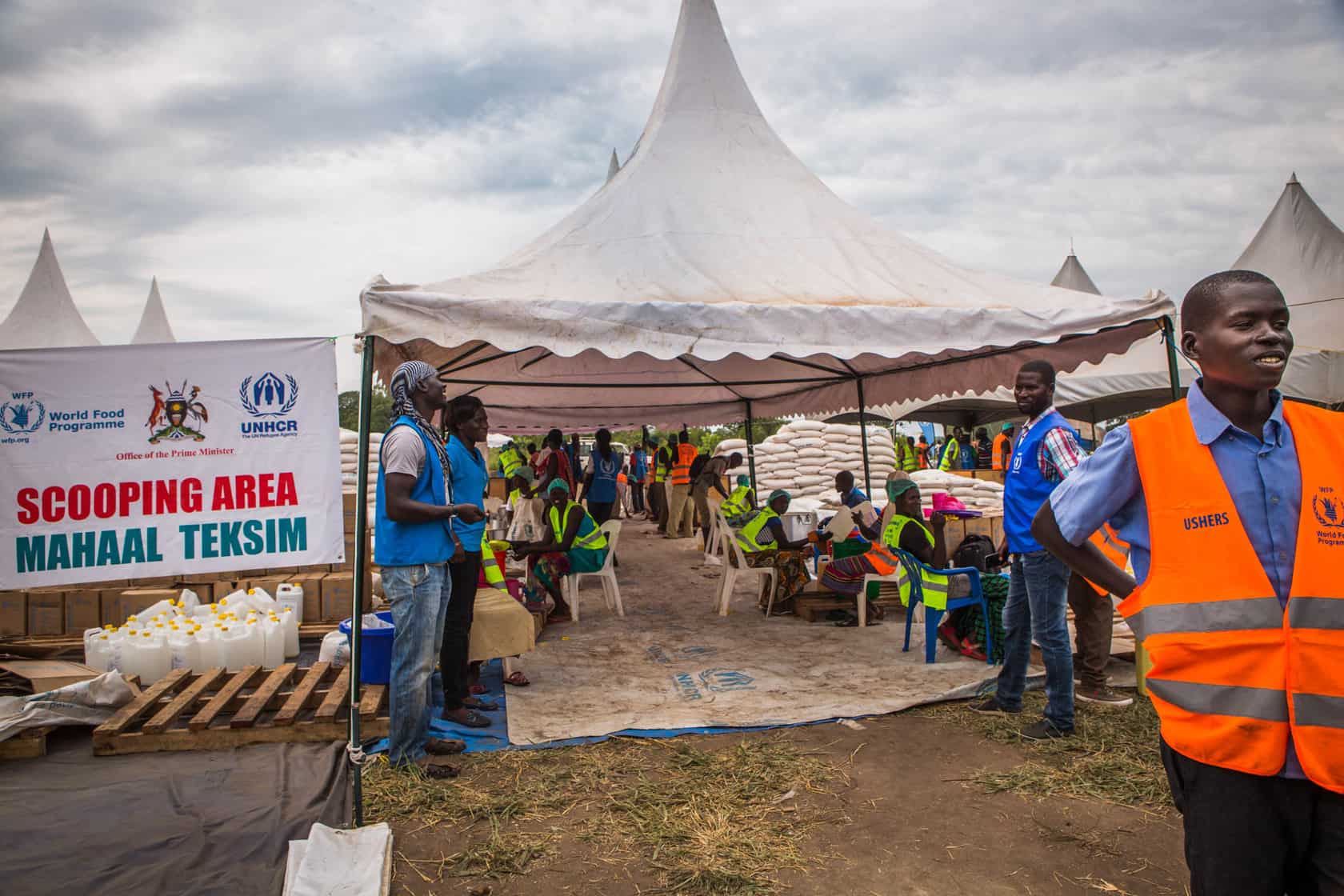
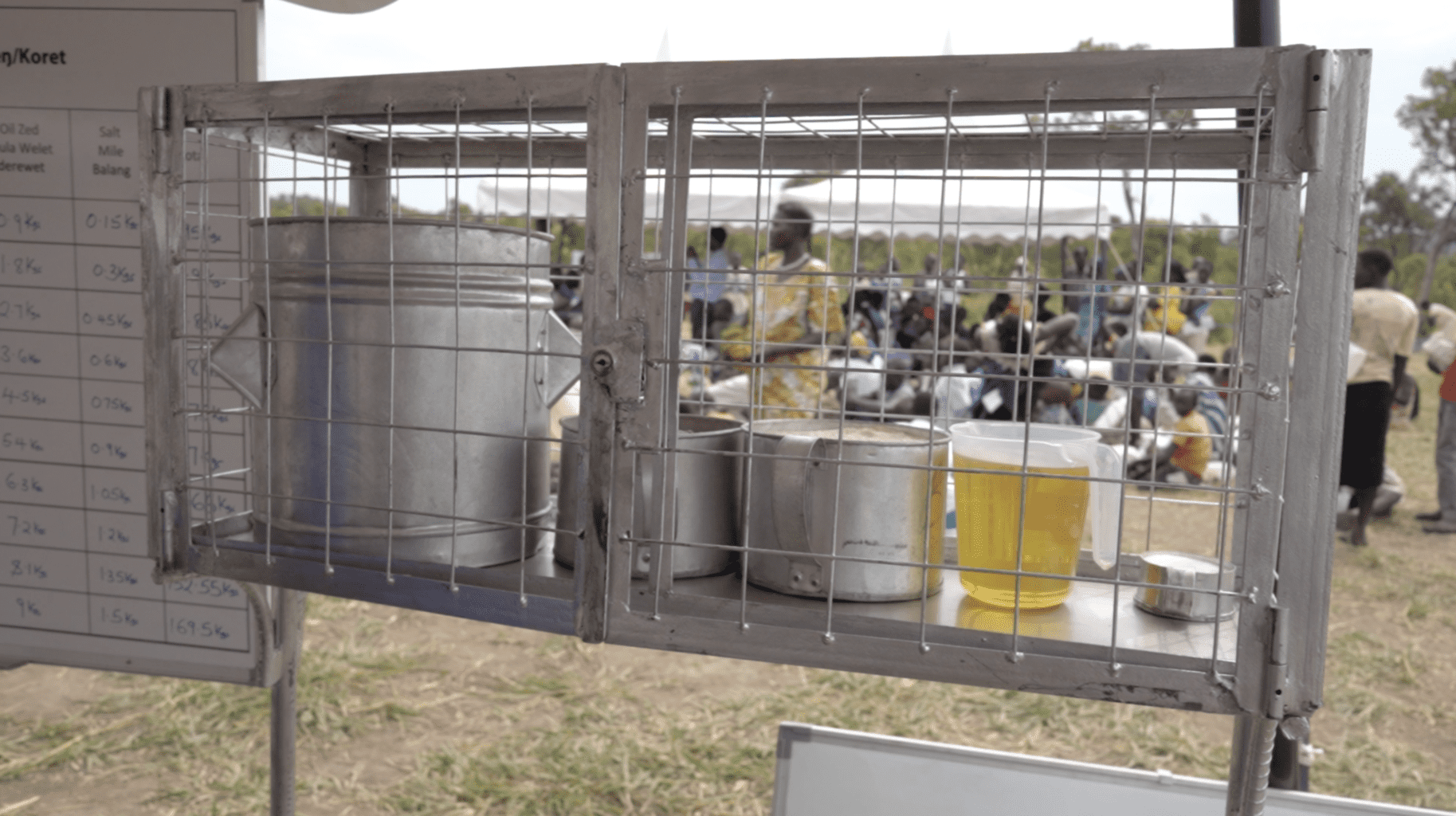
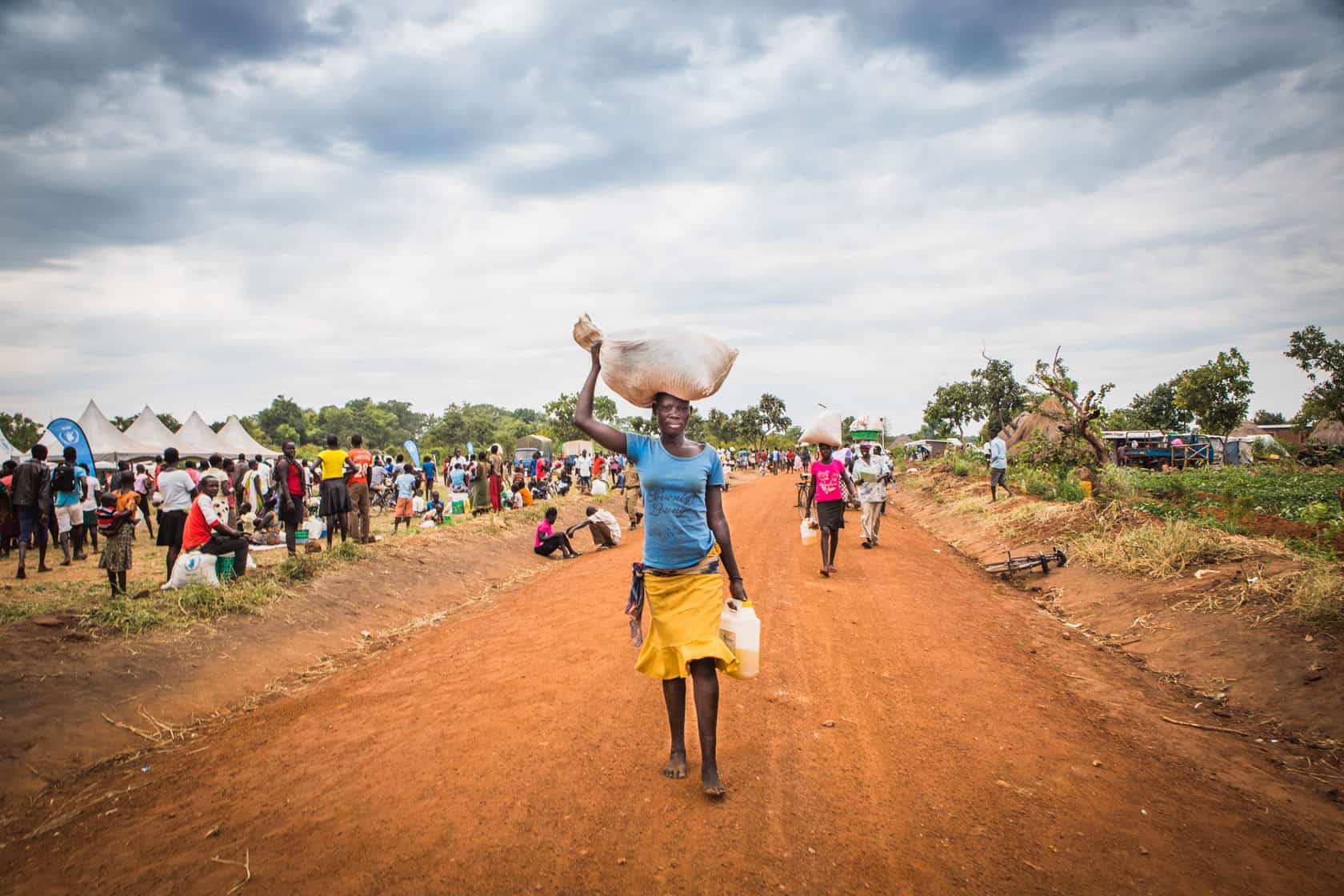
If you are a 14-year-old head of the household with 6 brothers and sisters, you have to skip school, walk at least an hour, then wait for the electronic fingerprint (and possible retina scan) to be cleared for food pickup. Once in line, you go to each station where you are given your monthly rations, slowed by weighing down to the gram to ensure no one gets too much or too little. Then, you have to sell some of your already meager portions to get a ride home or walk for several hours with 261.58 lbs (118.65 kgs) of food. Once home, you have to sell more of your food to pay to grind the maize, and then you have to feed your brothers once a day for the month. The food never lasts so family members go the last week of the month with no food.
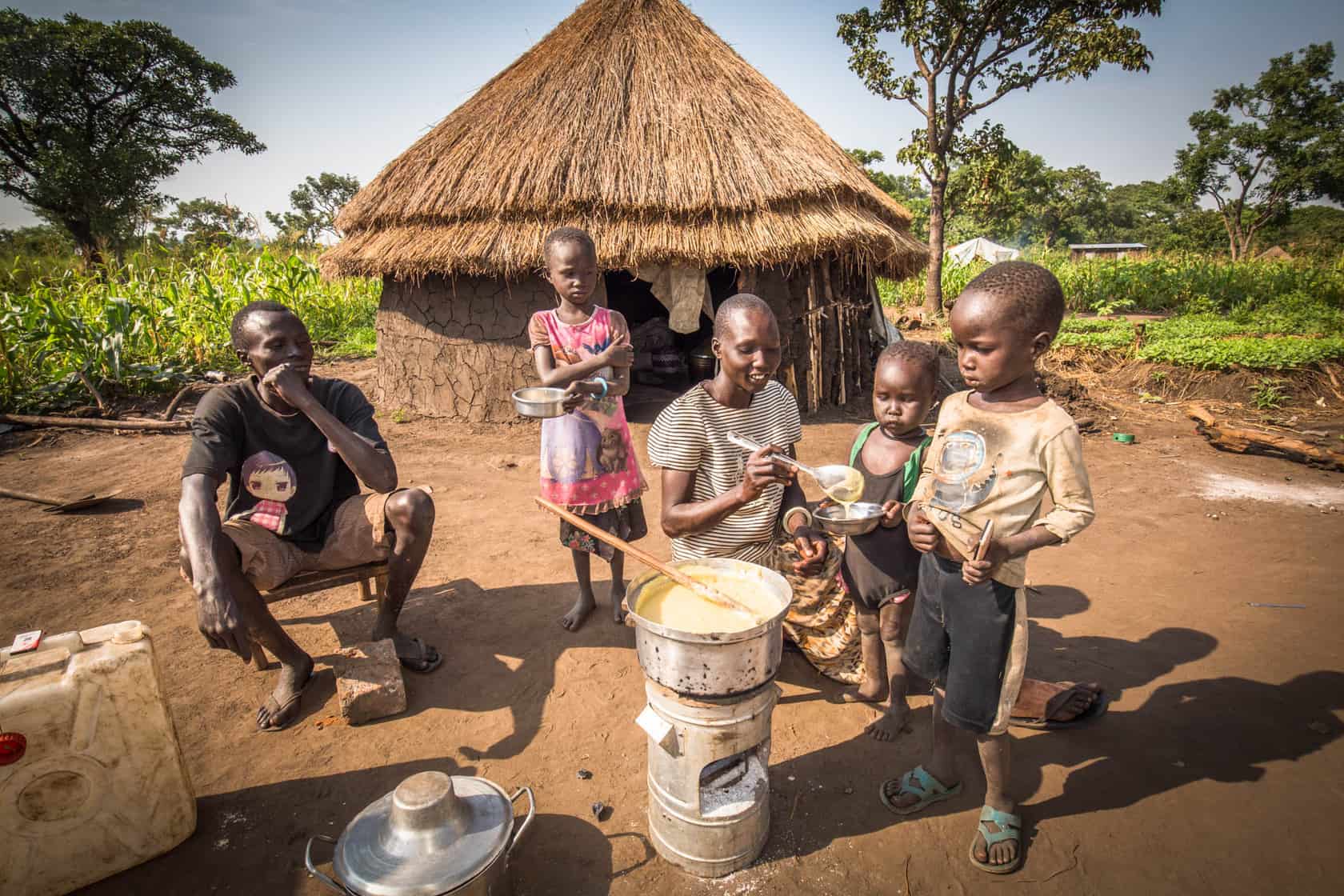
Even the people handing out the food know it is a broken system that is eking along, until now.
Enter Thomas Cole, the mastermind behind the permagarden concept and co-founder and technical advisor for African Women Rising. The key to his success is teaching people how to evaluate and revalue their local resources, build and nourish the soil and harvest and bank water, ultimately making their garden ecosystem stronger as it matures. In short he (and his growing team) is leading a food revolution for the developing world with his Permagarden Toolkit (Click Here for the Permagarden Toolkit).
Building on the permaculture design framework and informed by key agroecological principles and biointensive techniques, the permagarden approach is a basic, yet powerful tool. One of a handful of people in the world who specialize in this, Thomas is tackling a huge global issue with few resources and experiencing overwhelming success.
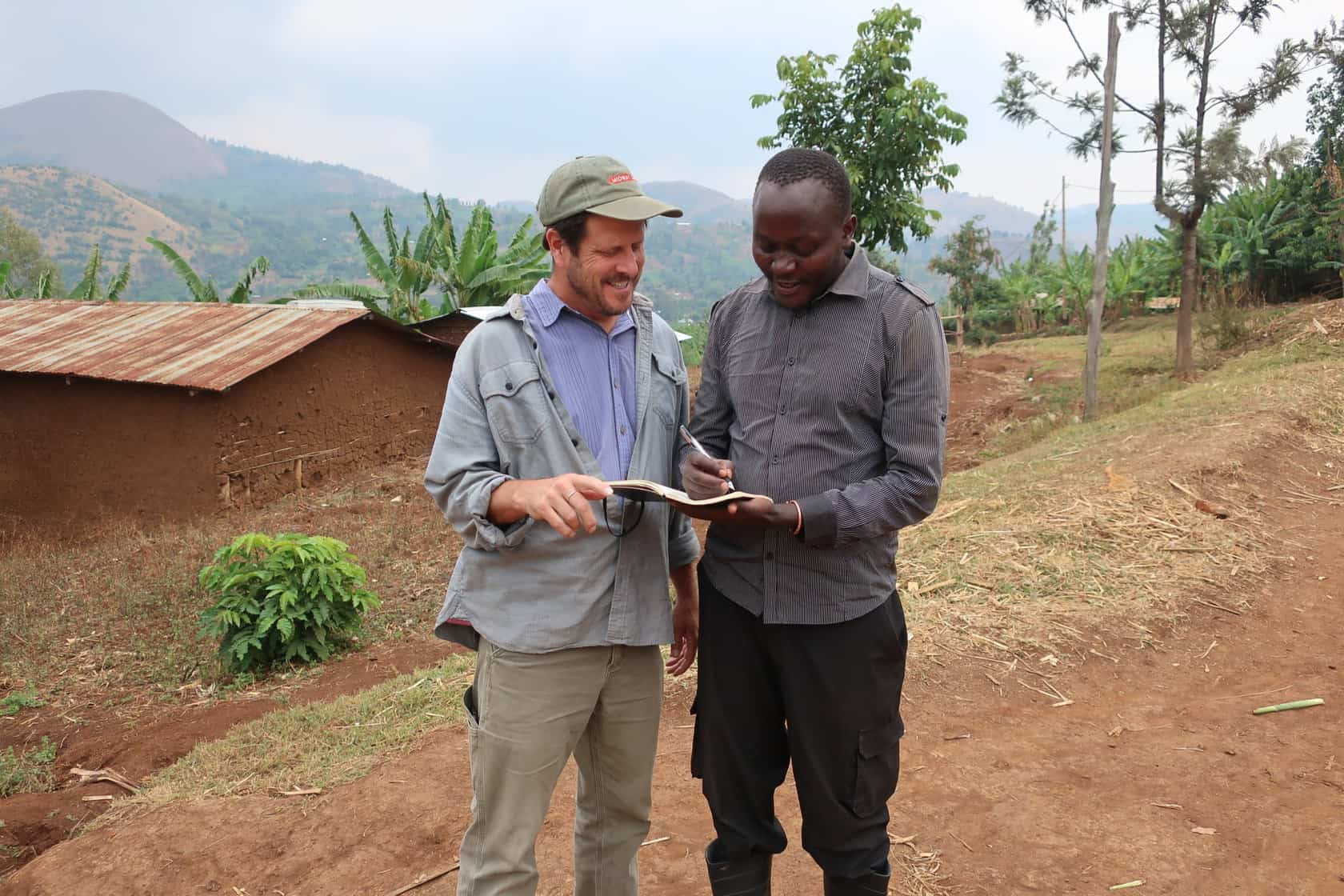
In the first two days of the three day training much of what Thomas does is give the permagarden principles a cultural context, “What do your children need to survive? Plants need the same thing. Who here gives as much care to their kale as to their daughter (which he notes always elicits laughter)? If we want our system to be strong, plants also need water, air, nutrients and protection, just like our children.”
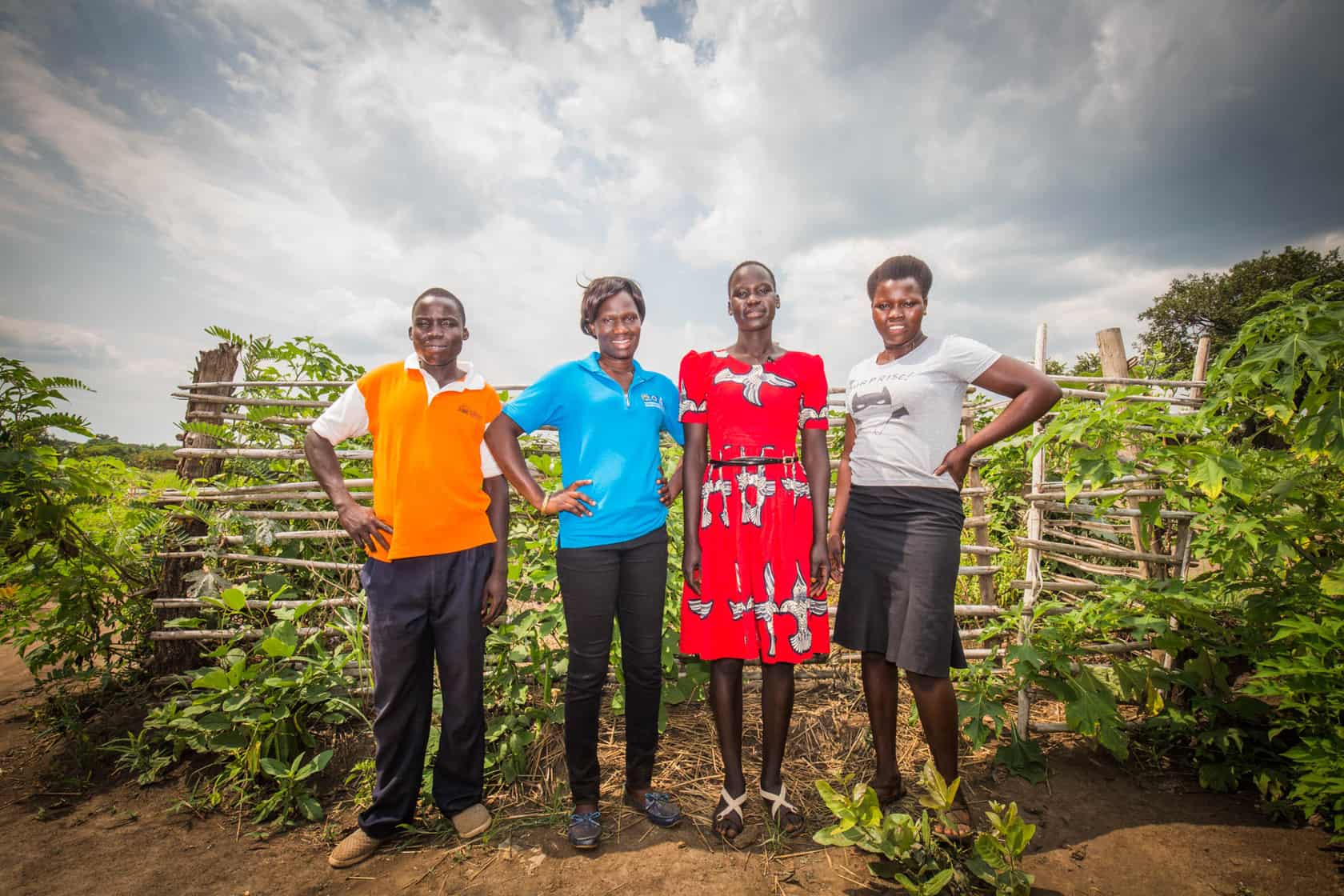
How do you do that with no money? Thomas walks through each refugee family’s 30m x 30m plot with the group, what he calls a ‘landscape resource walk,’ – so everyone can see they have a great variety of useful and free waste resources around them – charcoal dust, dried manure, fallen leaves and nutrition for the soil in the rubbish pits and bush all around them. Participants ‘walk the water,’ coming to understand the flow of rainwater across their land as they learn key principles in how to manage it to their benefit.
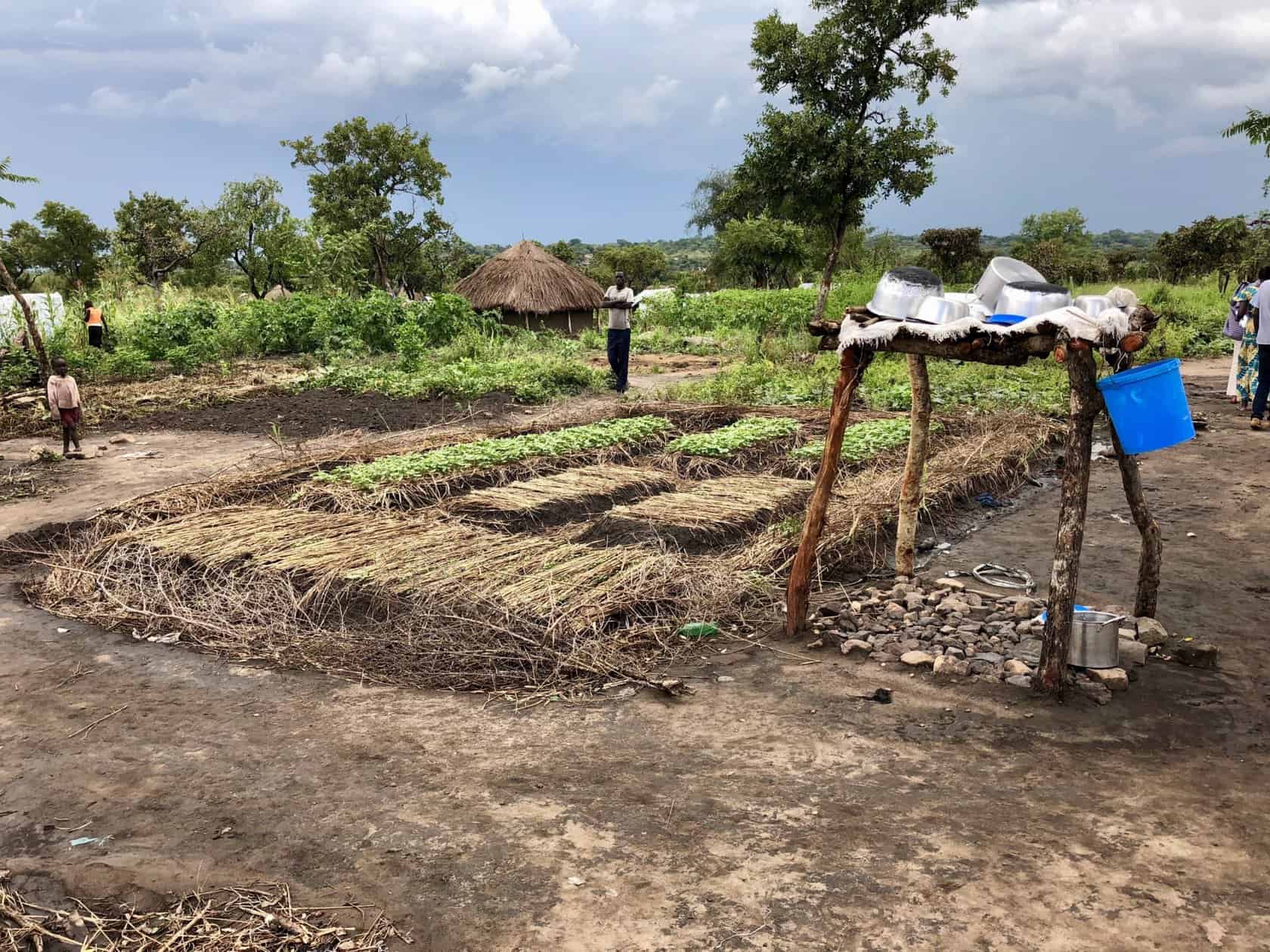
They also do practical demonstrations like a comparison garden bed side by side. One constructed by tilling the soil and putting straw on top and the other by burning (a traditional way to clear land). Then they pour water on top to simulate rain. In seconds the invaluable lesson of the best route forward to capture water is etched in famers minds forever.
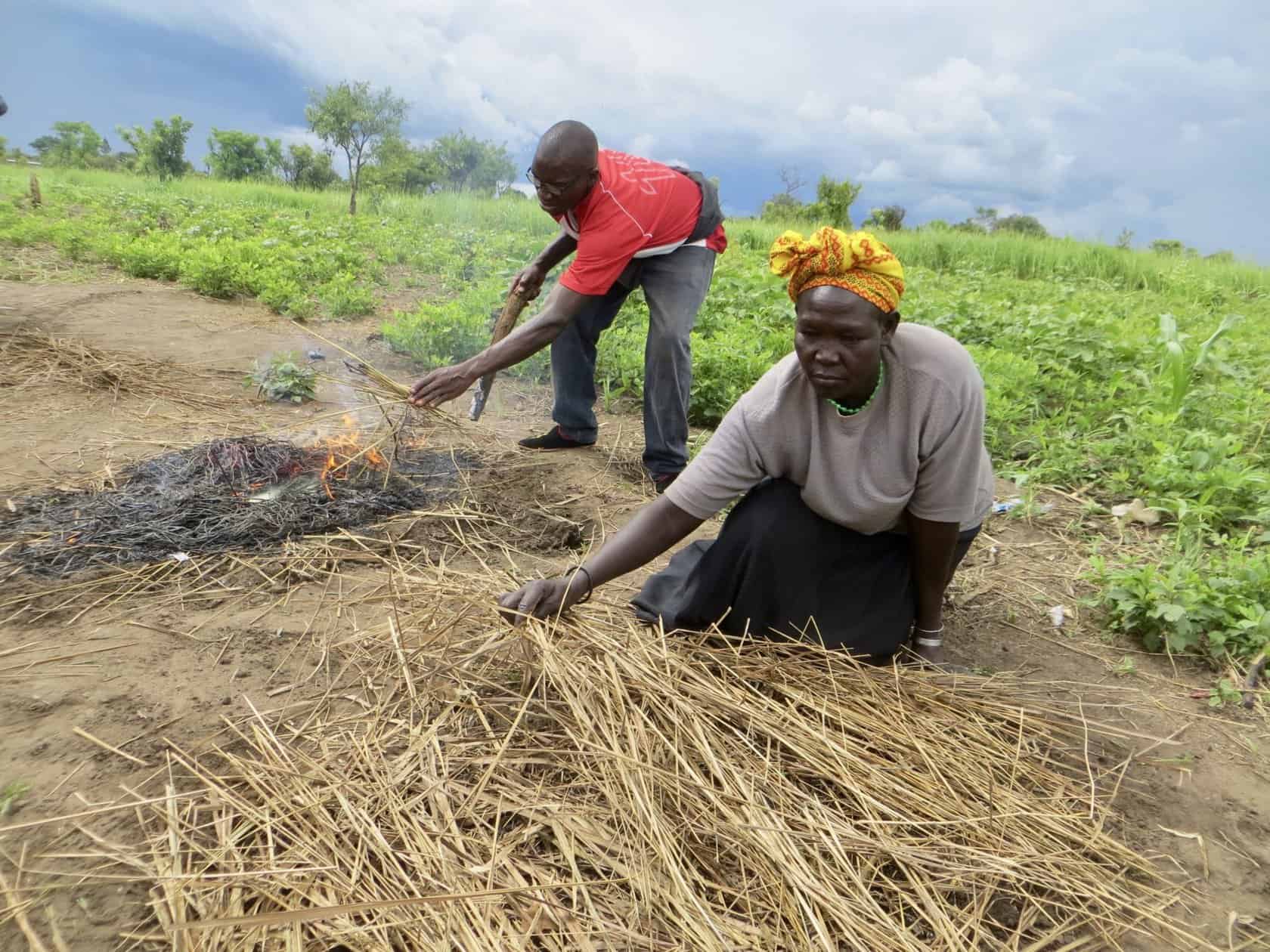
Then Thomas tells me with a glimmer in his eye, “Then we create”. He is not teaching them how to make a project. They are collaborating. He teaches them skills to evaluate the natural landscape and to create a garden that will work best with the resources they have. They learn how to harvest and bank valuable water in the soil for their trees and gardens just as they use the same skills to divert water from flooding their small homes. Combined with participants local knowledge of the land and plants their Permagardens are bursting with nourishment. Together they are creating an agriculture system designed to help the environment regenerate and get stronger as it matures. Compared to most food security programs in refugee settings based on hand-outs and food rations, this permaculture-based approach is radical in its simplicity and effectiveness.
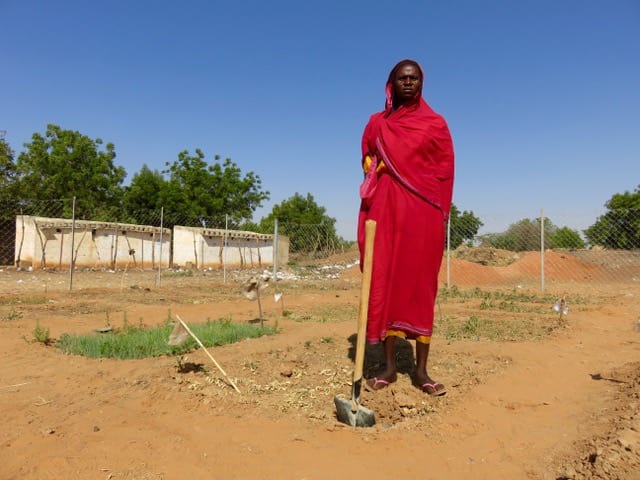
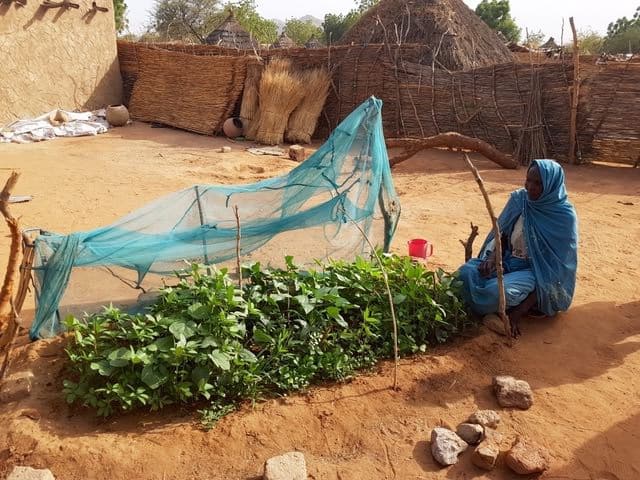
After three days, people who have lost everything, are now re-empowered with relevant education and seeds to create their garden. Two weeks later they are able to harvest their first greens. And within a month or two they are able to feed their family for the entire month, provide their family with veggies that will nourish their body and mind, and sell vegetables. Within a few more months they are able to save money, have extra money to do things like go to the doctor, and start other small businesses.
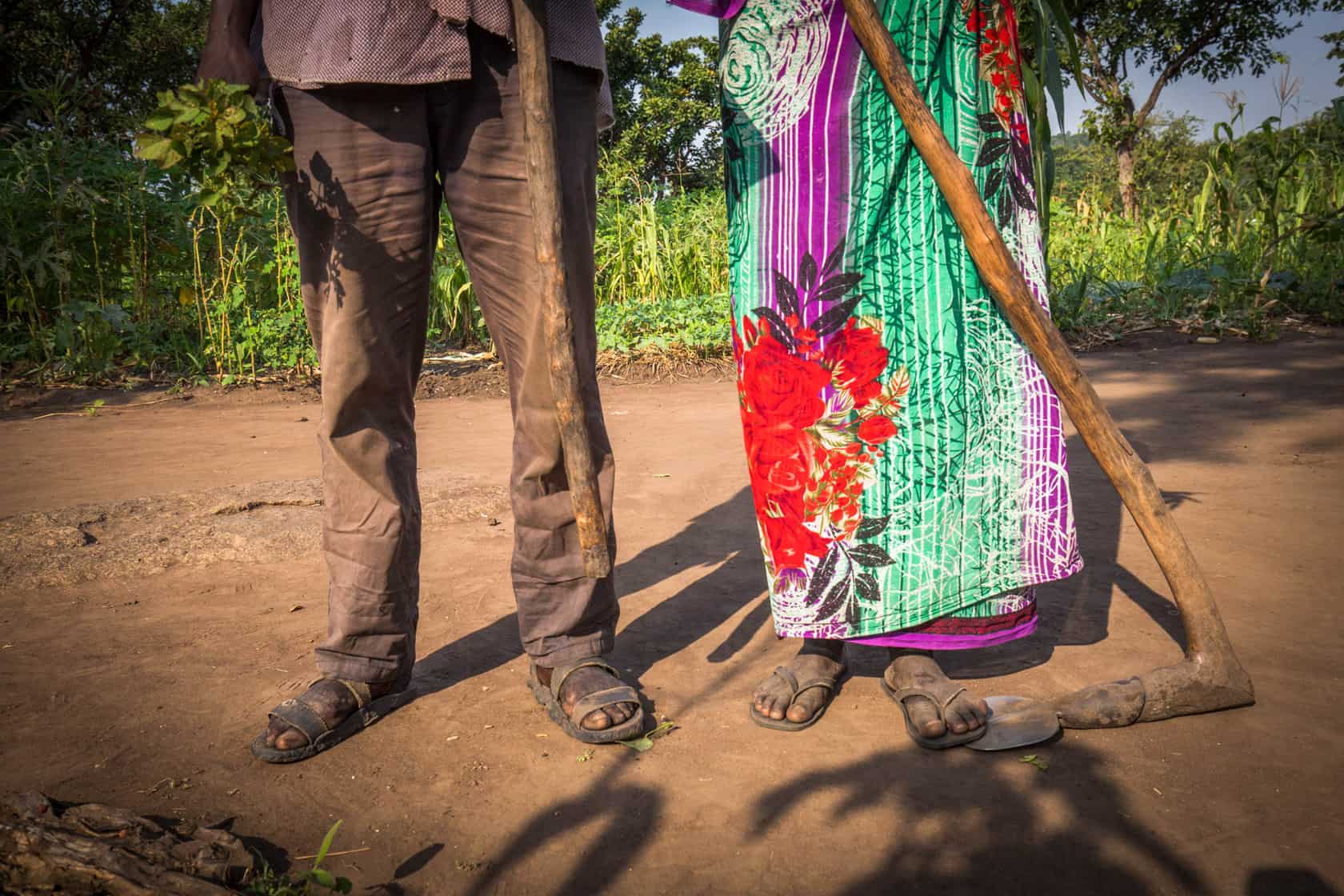
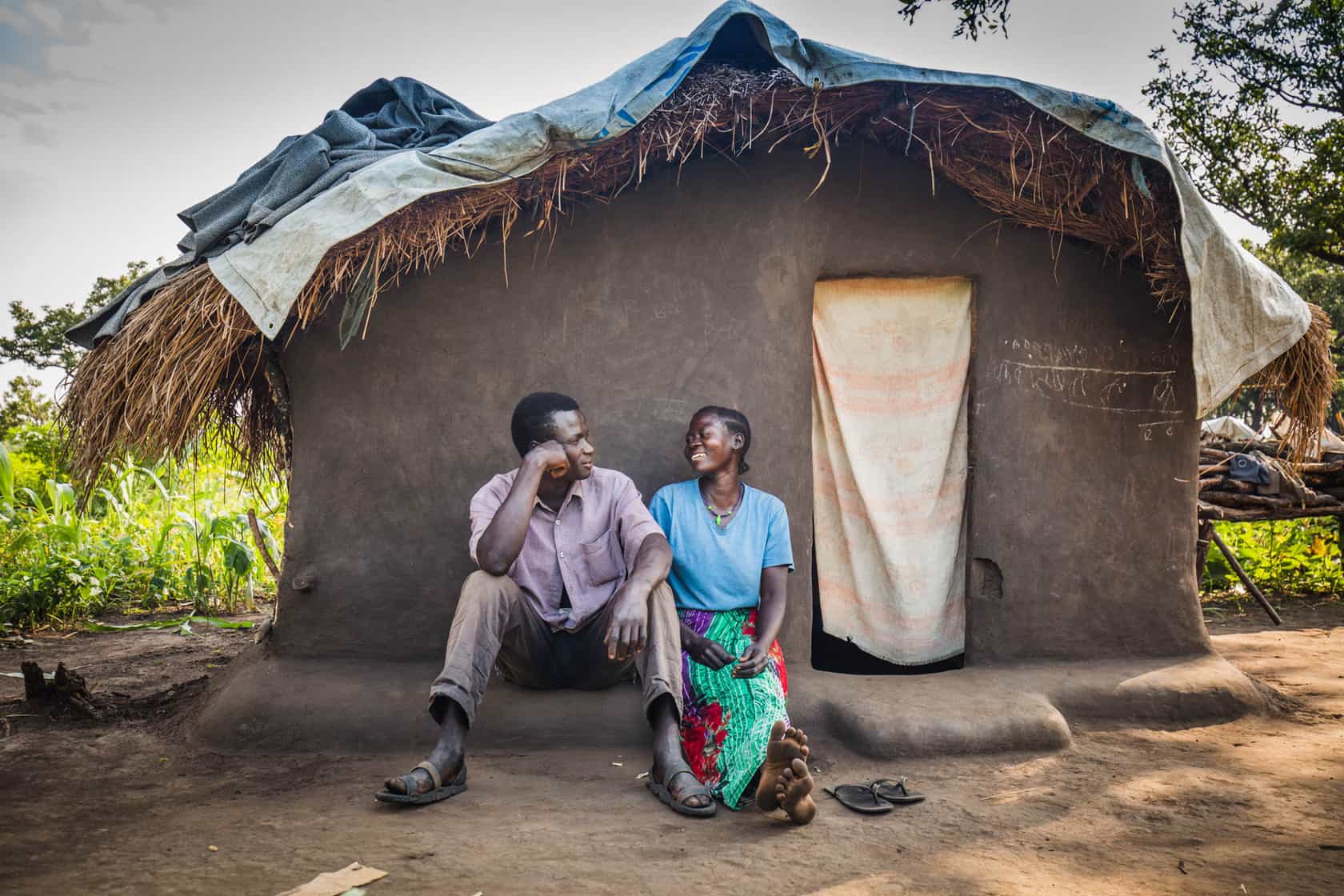
In the face of climate change and continued inequality in the world, the success of AWR’s permagarden program has tremendous implications for humans worldwide. In comparison with large international players their program is so successful even the UN has taken notice.
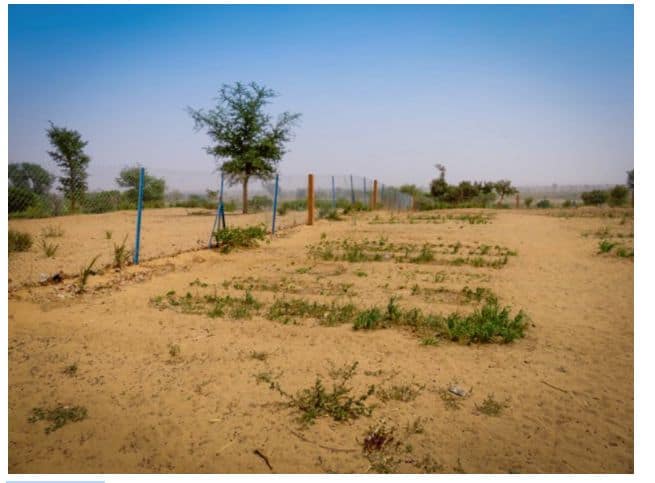
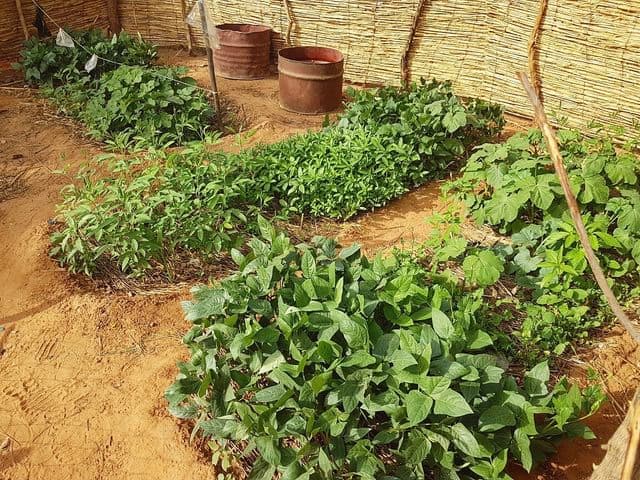
As we walk around visiting garden projects we meet Lakot Linda, a single grandmother in her 60’s who is head of household for her 4 grandchildren. Their mother died and they have not located father since fleeing South Sudan. Sitting outside of her mud hut she recounts how only living on beans her eyesight began become cloudy. Her children were tired of the monotonous diet and started refusing to eat.
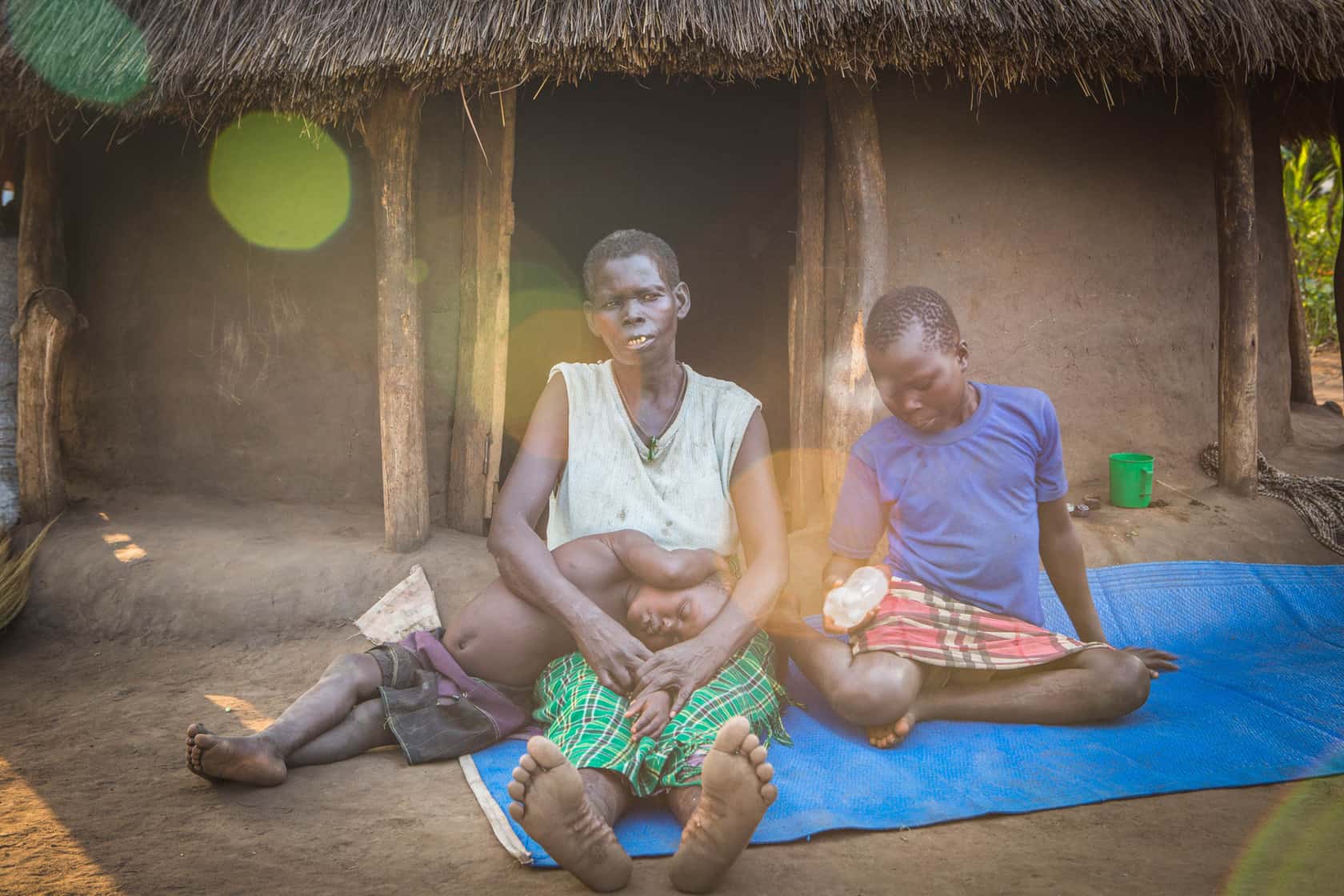
Once she learned the skills to build the garden they had greens within a few weeks. Now that they have veggies consistently they all have increased energy. She noted that their eyes are not cloudy anymore and they can focus. Proud that she can now provide for the children she says, “If I die tomorrow at least I left them a garden they can eat from.”
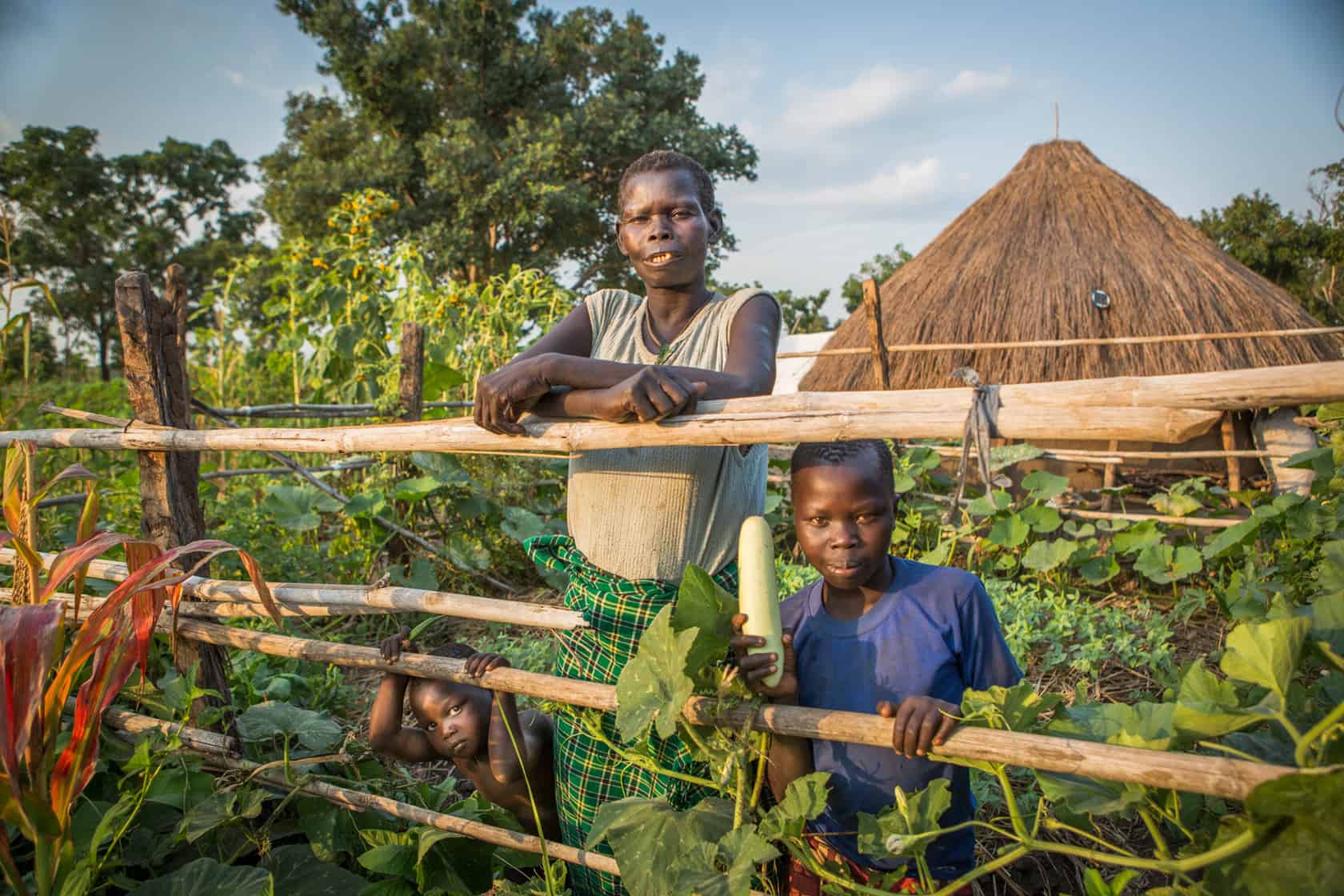
I run through the Permagarden with a group of small children, do the hokey pokey, and a round of duck, duck, goose before we drive out of camp in the last light of dusk. We stop in at small hastily constructed stalls made of bamboo, white UNHCR tarps, a door made from flattened tin cans that says “USAID” and whatever other scrap materials the business owner could find.
The most happening part of town is called “Jerusalem.” There is a pharmacy/clinic, restaurants, hotels, a tailor, a bicycle-powered lathe for sharpening blades, shops, and a dance hall. Some of the business owners are Ugandan who have come to make money, some are Ugandans who have come to help, and some like the Sudanese barber are people who arrived here with a trade. AWR’s staff, in their eagerness to help me explore the camp, randomly recruit a young boy to have his head shaved so I can take photos of the barber at work. I couldn’t help but laugh – I hoped this poor kid really did want his hair cut!
A few hours later I shower in an open air clay brick shower stall with my head poking out of the top. As I pour the cool bucket of water over my head under the cover of a million stars, serenaded by cicadas, the words of my longtime travel companion, Mr. Eddie Vedder, echoed in my ears, “We have a greed for which we have agreed. You think you have to want more than you need. Until you have it all, you won’t be free”.
The deep inequalities in our world that cause malnutrition, poverty and war do not have to exist. It is only because of our collective choice to act from lack and scarcity, believing these inequalities exist, that we bring them into reality and perpetuate them.
My rustic cement floor accommodation has only a double bed, mosquito net, and metal doors and windows lit by candle light. Yet it is absolute luxury compared to where the hundreds of people I had met that day were sleeping. As I settled into my clean sheets, I thought of the families in one room dirt huts settling in for the night just yards away.
The next morning, we meeting Agusti one of the most successful entrepreneurs in the program. Not only does his garden thrive, we discover over the course of the interview he has opened two other businesses, bought a goat, and has managed to increase his income approximately 150%.
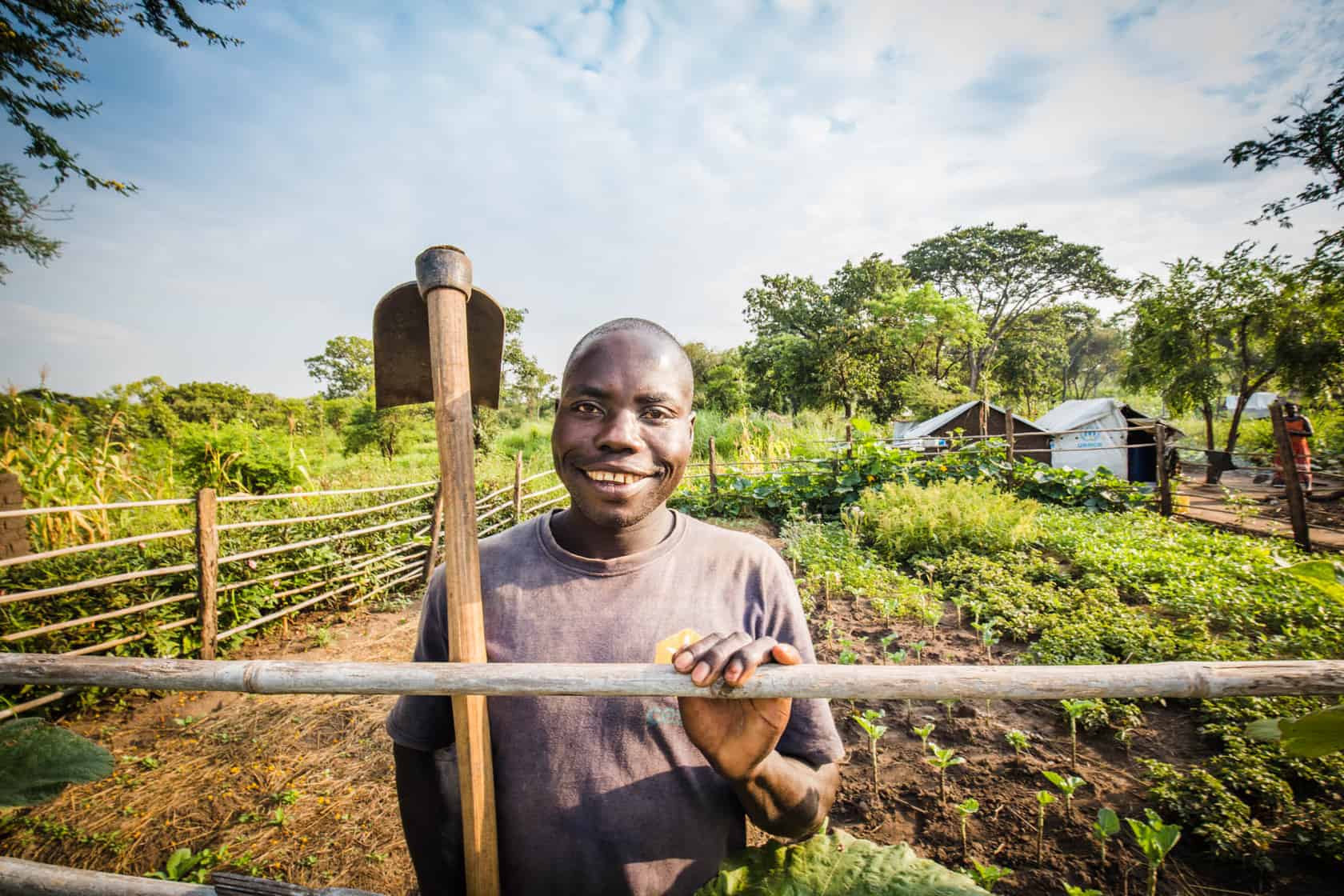
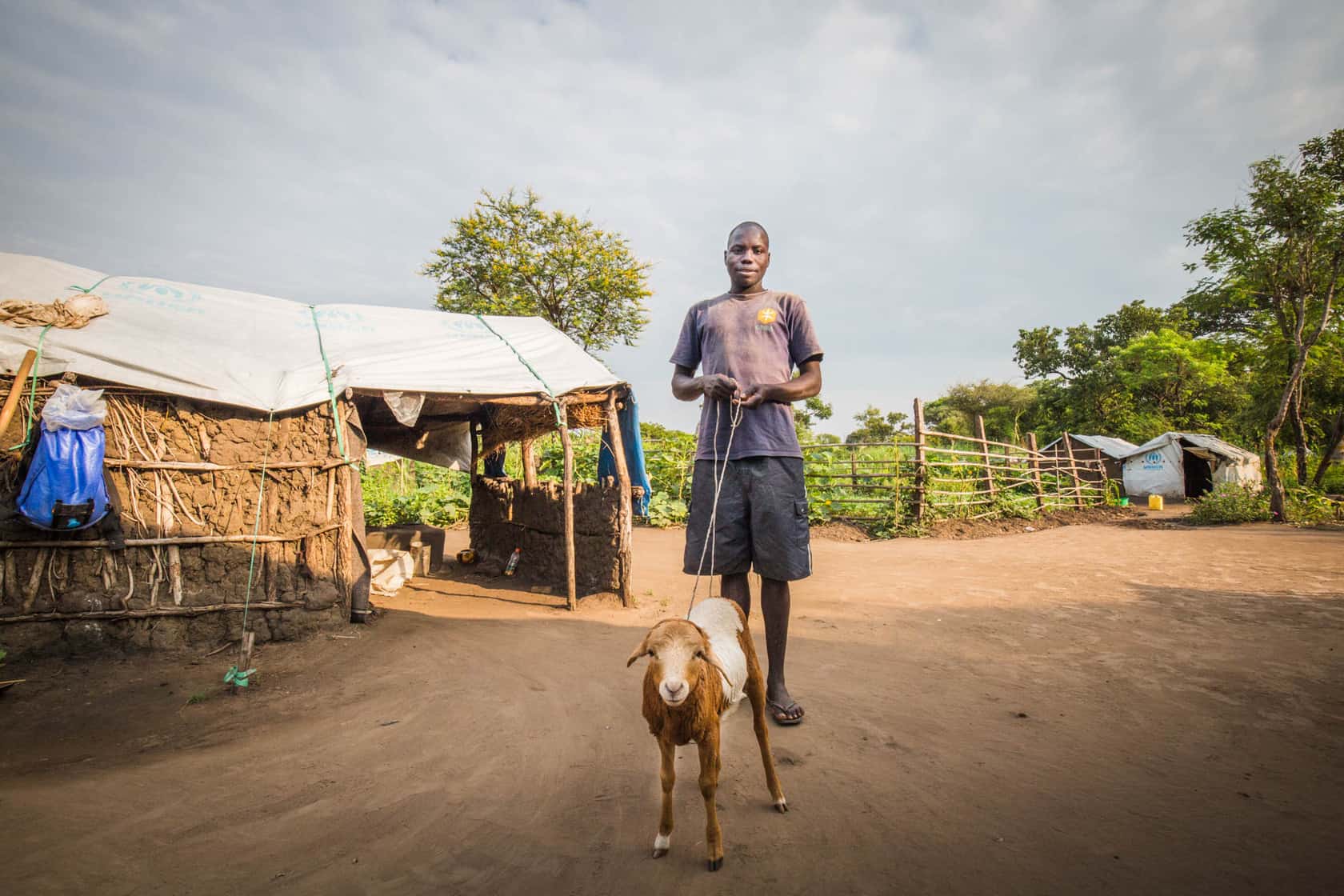
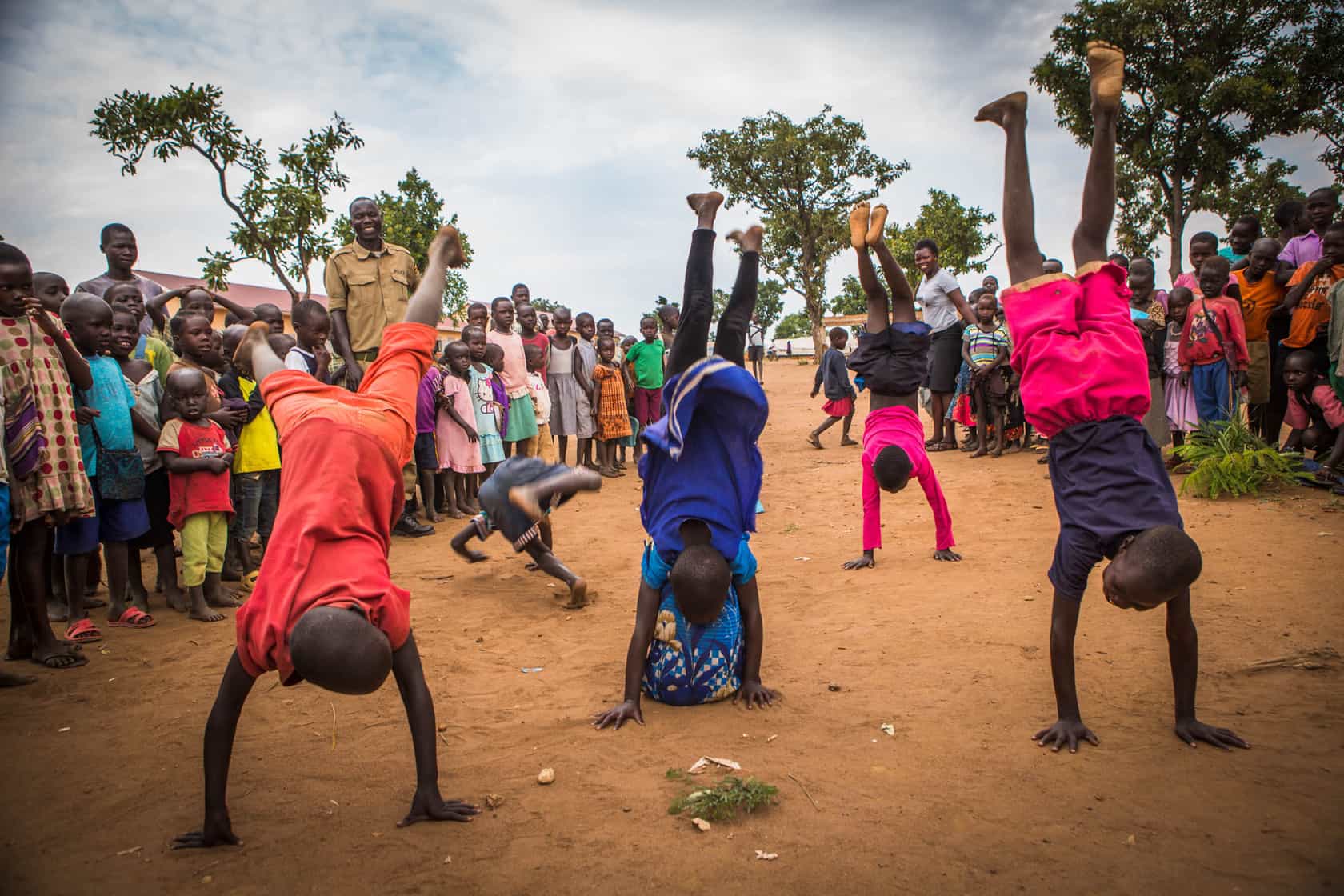
Next we meet Yaka Lucia. After her husband was killed during fighting in South Sudan, she walked with nothing but her three children – two months pregnant – to the border of Uganda to be brought to a refugee camp. Seven months later she delivered her baby girl in her mud hut with the help of two women she had just met. As the head of the household she somehow had the time to start a permagarden and is now able to feed her children for the entire month, until the next round of World Food Program rations are given.
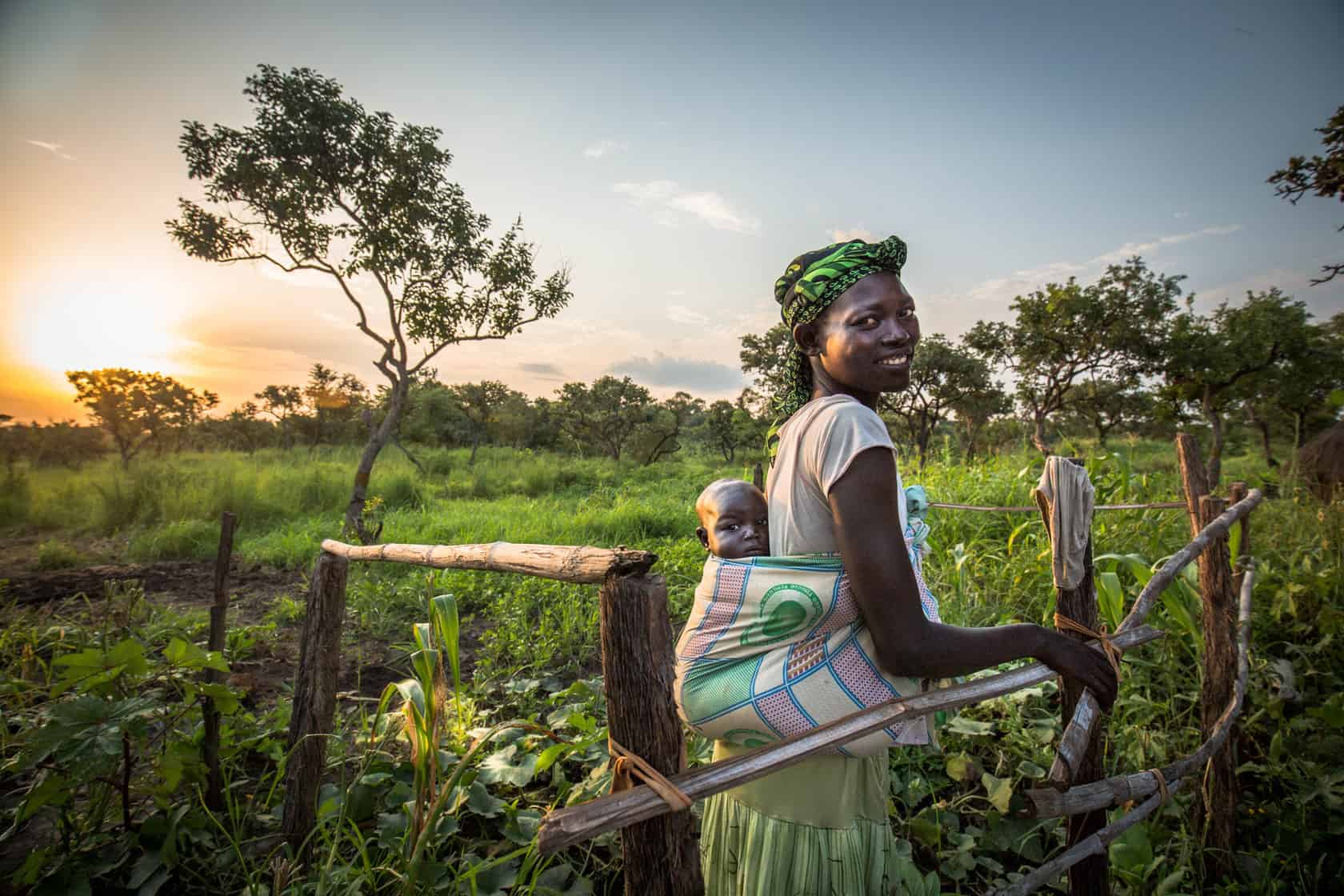
She now has the cutest buttery fat baby I have ever met. Before Yaka Lucia planted her garden, they were only living on maize, soya porridge and beans. She tells me that living on food rations, her breast milk dried up and she was unable to feed her baby. Once she started eating the greens from her garden her breast milk returned. She has been able to feed all the kids between her Permagarden and her food rations, she has not yet had the extra money to save and start a small business.
At the end of the interview my eyes well with tears as I tell her I am sorry for the loss of her husband, but so grateful he left her with this precious little gift – Rosa.
Before we leave I use a family latrine hand carved out of mud with a thatched grass roof, filled with the strong stench of shit and swarming flies in the mud day heat. For me, this is a one time experience, for them this is their life with no end in sight.
My police escort was waiting for me outside the latrine. I’m assuming the police monitoring was two fold, that I was only going where I was supposed to go, not handing out money or food, and of course ensuring my safety – which I never felt was in question. I was more worried the gun about slung over his shoulder accidentally firing inside the car than about encountering problems.
I leave the camp with the AWR staff – exhausted, stinking of sweat, with every crevice of my being (including my lungs and photo gear) covered in red dust. The children – who almost stampeded me in excitement the day before during duck-duck-goose – excitedly yell and wave goodbye.
Exhausted with 5 hours of sleep under my belt, the first moment I have to sit and reflect is on a supposed 6 hr bus ride back to Kampala.
[Insert a big fat F-Bomb here].
How do we live in a world where our priorities are so messed up? People in resource rich countries end up in the resource curse with no money and no home while corporations profit by extracting their wealth out from under them. Wars for fossil fuels we burn that desecrate our planet, greed of money at the expense of others, starvation they all result from the collective belief of scarcity. In truth, the world doesn’t have to be this way, but collective human belief there is not other way and action from scarcity make it so. The business of disaster response capitalism springs up around all these issues. Defunct systems help the problems eke along instead of truly offering sustainable solutions. It’s our choice, the decisions we continue to make, the places we put our money, that perpetuate these issues. It no longer has to be this way, but it often seems that as one person or even a group there is little we can do.
And that is exactly what excites and fascinates me about African Women Rising’s Permagarden program. They are doing things differently and not only is it working, they are changing lives and futures.
We are all the same as the person living at the end of a remote red dirt road in the Sudanese refugee camp in rural Uganda. Just by chance, for the moment, we are in more fortunate situations. With every day that climate change goes unchecked, those of us in industrialized countries are one day closer to the same instability and food scarcity. This issue will matter to us as much if we live in a city as if we live in a refugee settlement.
As Thomas put it, “With greater weather fluctuations worldwide, our focus is on soil and water. In a dry environment, if we can help people understand how to capture and use water in the best possible way, these practices can create lasting change that will create a more resilient system. There is no magic bullet, but we can work to build the soil-food web and microbiology. The more we have capacity to deal with “extreme” weather and the better we can withstand the unknowns of climate fluctuation and timing. These practices stabilize the environment when hit by extreme weather.”
On the eight hour bus ride to Kampala I was hit by a striking revelation.
One day in the not so-distant future, a refugee farmer from this remote camp in Northern Uganda may be one of the few “experts” in the world who has honed the skills of “permagardening”. She could be the one that takes you on a resource walk, instructs you how to dig a double-dug bed, set up the half moon water catchment and harvest the seeds that you and your family need to survive, just as she did once upon a time. You may want to support these budding experts now. African Women Rising.
Check out other FitWild stories by Sarah Fretwell
Forsaking the Next: http://fitwild.wpengine.com/news/forsaking-the-next
How do you Save a Nation: http://fitwild.wpengine.com/news/how-do-you-save-a-nation
Tara Expeditions part I: http://fitwild.wpengine.com/news/tara-expeditions-part-1
Tara Expeditions part II:http://fitwild.wpengine.com/news/tara-expreditions-part-2
